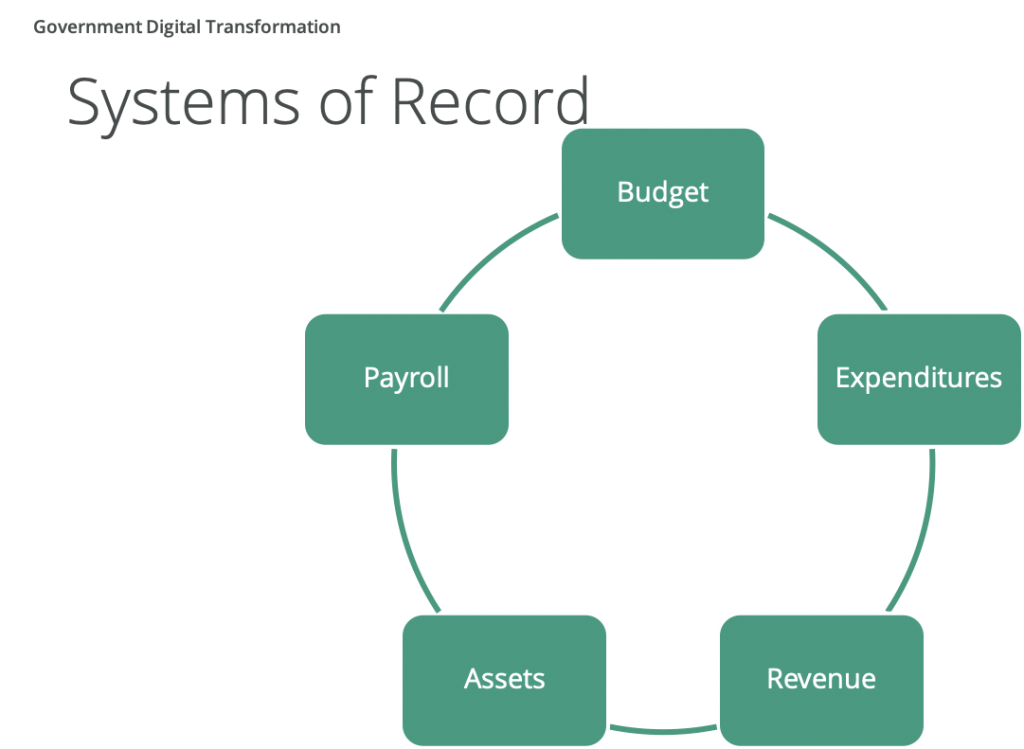In government, systems of record stand as the bedrock upon which effective public financial management (PFM) is built. These critical information systems serve as the central repositories for information, consolidating and organizing vast amounts of data from diverse sources. By establishing a single source of truth, systems of record empower governments to enhance transparency, accountability, and decision-making, ultimately leading to improved stewardship of public funds.
Demystifying Systems of Record
At its core, a system of record is a comprehensive database that captures and maintains an organization’s most essential information. It acts as a central hub, integrating data from multiple sources to create a holistic view of the government’s operations. By providing a single authoritative source for critical data, systems of record eliminate data silos and inconsistencies, ensuring that everyone is working with the same accurate and up-to-date information.
The implementation of systems of record is particularly crucial for governments, as they grapple with managing vast amounts of data related to finances, human resources, procurement, and other critical functions. By consolidating this data into a centralized repository, governments can gain a clear understanding of their financial position, track spending patterns, identify areas for improvement, and ensure compliance with regulations and legislation.
The Benefits of Systems of Record
Investing in systems of record yields a multitude of benefits for governments, transforming their approach to PFM:
- Enhanced data integrity and security: systems of record safeguard sensitive financial information by employing robust security protocols and access controls. Opening access to view information is balancing with rigorous checks to make sure only those with the correct authorizations can change protected information (for example, employee’s names). This mitigates the risk of data breaches and unauthorized access, ensuring the confidentiality and integrity of critical data, while leveraging the benefit of increased efficiency of access to necessary information.
- Improved decision-making: with easily accessible and accurate data at their fingertips, government officials can make informed decisions that align with financial goals and public needs. Systems of record provide a comprehensive overview of financial performance, enabling officials to identify trends, assess risks, and allocate resources effectively.
- Streamlined operations and reduced costs: systems of record streamline administrative processes, automating tasks and eliminating manual interventions. For example, forms can be easily developed to improve the speed of data collection, making it simple for anyone to add information to records when needed. Collaboration within teams and across departments is also enabled. This leads to reduced operational costs, improved efficiency, and a more streamlined workflow.
- Enhanced transparency and accountability: systems of record promote transparency by providing a clear and consistent view of financial information. This fosters accountability within the government and enhances public trust.
- Compliance with regulations and legislation: systems of record facilitate compliance with regulations and legislation by automating records retention and destruction requirements. This reduces the risk of non-compliance and ensures that the government is operating within relevant legal frameworks.
- The foundation for more advanced digital transformation initiatives: systems of record provide the building blocks for more complex approaches on the road to digital transformation.
A Roadmap for Successful Systems of Record
While the implementation of a system of record offers significant benefits, it is not without its challenges. Careful planning and execution are crucial to ensure a successful implementation. Key mitigation measures include:
- Defining needs clearly: before embarking on the implementation of a system of record, governments must clearly define their needs and objectives. This involves identifying the data sources, establishing data governance policies, and determining the scope of the system.
- Managing the process effectively: implementing a system of record requires a structured project management approach to ensure alignment with organizational goals and timelines. This involves clear communication, stakeholder engagement, and risk mitigation strategies.
- Embracing continuous improvement: systems of record are not static entities; they evolve alongside the organization’s needs and the changing landscape of PFM. Governments should adopt a continuous improvement mindset, regularly reviewing and updating their systems of record to maintain relevance and effectiveness.
- Understanding the potential, and the limitations, of a system of record: ensuring a shared understanding of what a system of record can (and can’t) do is essential. Many digital project implementations of all kinds are made more complex, or are considered to have ‘failed’, because stakeholders did not share the same understanding of what the project would deliver. Systems of record significantly improve PFM from manual or paper processes, but they do not deliver full-scale digital transformation alone.
Examples of Systems of Record in Public Financial Management
Systems of record are essential for providing core financial, procurement, human resources and performance management processes.

The FreeBalance Accountability SuiteTM can consolidate a diverse range of data across the span of public financial management functions. For example, our tools enable comprehensive recording of tax records, pensions information, and supplier contracts data, amongst other critical government information.
Using the FreeBalance Accountability SuiteTM has enabled more than 25 government organizations around the world to improve transparency and improve efficiency.
Next steps
Systems of record stand as indispensable tools for effective public financial management. By enhancing data integrity and streamlining operations, systems of record empower governments to make informed decisions, improve transparency and accountability, and ultimately fulfil their mandate of responsible stewardship of public funds. As governments embrace the digital transformation journey, systems of record also serve as the foundation upon which more advanced systems and citizen-centric initiatives can be built.
To find out more about how the FreeBalance Accountability SuiteTM can meet your systems of record needs, set up a call with our PFM experts.
